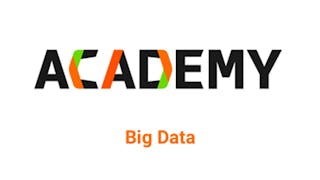The Big Data Analytics course offers a deep dive into the technologies, tools, and techniques used to process and analyze large-scale data. Learners will explore the Hadoop and Spark ecosystems, gaining hands-on experience with essential components such as Hadoop Distributed File System (HDFS), MapReduce, Pig, and Hive. The course also covers both relational (SQL) and nonrelational (NoSQL) databases, helping learners understand the appropriate contexts for each type of data storage.


您将学到什么
Gain a deep understanding of Hadoop and Spark ecosystems for managing big data. Become familiar with tools like Hive and Pig to query large datasets.
您将获得的技能
要了解的详细信息

添加到您的领英档案
June 2025
16 项作业
了解顶级公司的员工如何掌握热门技能

该课程共有11个模块
Welcome to the Big Data Analytics course! By the end of this course, you will develop an understanding of the various technologies associated with Hadoop and the Spark ecosystem of tools and technologies. You will get hands-on experience working with core Hadoop components like MapReduce and Hadoop Distributed File System (HDFS). You will learn to write Pig scripts and Hive queries and extract data stored across Hadoop clusters. You will also learn about relational (SQL) and nonrelational (NoSQL) databases and discuss scenarios in which one is preferred over the other for data storage. You will also gain insight into the Spark ecosystem which makes running jobs across clusters very fast, thereby having several emerging applications. You will also learn a hands-on example of implementing and deploying a machine-learning application that handles streaming data on the cloud. This is an advanced-level course, intended for learners with a background using predictive tools and techniques, experience in writing basic Structured Query Language (SQL) queries, and an understanding of Python programming. The knowledge you gain from this course will help you make a career as a business analyst. You will gain skills to draw insights from data that has characteristics of high velocity, volume, and variety. The data with such characteristics is called big data and is increasingly being used by organizations for competitive advantage and decision-making. In this module, you will learn about Big Data applications and the various components of the Hadoop ecosystem. The module also discusses the MapReduce paradigm that facilitates distributed processing of data. You will also gain an insight into the HDFS and use it for storing files. Hands-on examples are provided using Hortonworks Data Platform Sandbox, which can be installed on a Windows/Mac computer with at least 8 GB of available RAM.
涵盖的内容
13个视频4篇阅读材料2个作业1个讨论话题
This assessment is a graded quiz based on the module covered in this week.
涵盖的内容
1个作业
In this module, you will learn about the Hive scripting language and its usage for mining data from Hadoop clusters. Hive provides an SQL dialect called Hive Query Language (abbreviated HiveQL or just HQL) for querying data stored in a Hadoop cluster. Hive is most suited for data warehouse applications, where relatively static data is analyzed, fast response times are not required, and when the data is not changing rapidly. Hive makes it easier for developers to port SQL-based applications to Hadoop, compared with other Hadoop languages and tools. Like all SQL dialects in widespread use, it does not fully conform to any particular revision of the ANSI SQL standard. It is perhaps closest to MySQL’s dialect, but with significant differences. Hive supports several sizes of integer and floating-point types, a boolean type, and character strings of arbitrary length. Lastly, taking a real-world data set, you will load it in the Ambari environment for analysis using HDFS and HQL. You will go through the process of creating tables, loading data, and analyzing it using a Hive Query Language.
涵盖的内容
9个视频2篇阅读材料2个作业1个讨论话题
This assessment is a graded quiz based on the modules covered this week.
涵盖的内容
1个作业
In this module, you will learn about the Pig Latin scripting language and how you can leverage it to query big data on Hadoop clusters. You will also learn about the different data types and commands available in the Pig Latin language and how they can be used to define and manipulate data in the Hadoop ecosystem. Furthermore, you will be to work on a practical example of a publicly available data set to run Pig Latin scripts for data analysis.
涵盖的内容
7个视频2篇阅读材料2个作业
In this module, you will be introduced to the need for NoSQL databases. You will also get introduced to HBase, a NoSQL database, and its role in the Hadoop ecosystem. You will learn about the CAP theorem and how it affects the trade-offs between choosing the different NoSQL database options available on Hadoop. You will also learn about CAP consistency, availability, and partition tolerance in detail and how they affect our choice of technology to access and manipulate data on Hadoop. Lastly, you will get insights into other emerging cloud-based NoSQL solutions.
涵盖的内容
8个视频2篇阅读材料2个作业1个讨论话题
This assessment is a graded quiz based on the modules covered this week.
涵盖的内容
1个作业
In this module, you will be introduced to the popular Apache Spark platform for Big Data processing. You will explore the key components of Apache Spark that provide significant benefits in distributed computing. You will also be introduced to the Resilient Distributed Datastores (RDD) and the Spark DataFrames. Furthermore, you will be introduced to Spark SQL and Spark Streaming.
涵盖的内容
11个视频4篇阅读材料2个作业1个讨论话题
This assessment is a graded quiz based on the module covered in this week.
涵盖的内容
1个作业
In this module, you will learn about MLlib, which is used for making predictions on large datasets that need distributed processing. You will be working on regression and classification tasks for large datasets. Then, a hands-on exercise with streaming data from the twitter API is implemented. This is a predictive streaming application to show participants an end-to-end big data scenario.
涵盖的内容
8个视频3篇阅读材料2个作业
Course Wrap-Up Video
涵盖的内容
1个视频
攻读学位
课程 是 O.P. Jindal Global University提供的以下学位课程的一部分。如果您被录取并注册,您已完成的课程可计入您的学位学习,您的学习进度也可随之转移。
位教师

从 Data Analysis 浏览更多内容
 状态:免费试用
状态:免费试用 状态:预览
状态:预览Alibaba Cloud Academy
 状态:预览
状态:预览
人们为什么选择 Coursera 来帮助自己实现职业发展




常见问题
To access the course materials, assignments and to earn a Certificate, you will need to purchase the Certificate experience when you enroll in a course. You can try a Free Trial instead, or apply for Financial Aid. The course may offer 'Full Course, No Certificate' instead. This option lets you see all course materials, submit required assessments, and get a final grade. This also means that you will not be able to purchase a Certificate experience.
When you purchase a Certificate you get access to all course materials, including graded assignments. Upon completing the course, your electronic Certificate will be added to your Accomplishments page - from there, you can print your Certificate or add it to your LinkedIn profile.
Yes. In select learning programs, you can apply for financial aid or a scholarship if you can’t afford the enrollment fee. If fin aid or scholarship is available for your learning program selection, you’ll find a link to apply on the description page.
更多问题
提供助学金,




